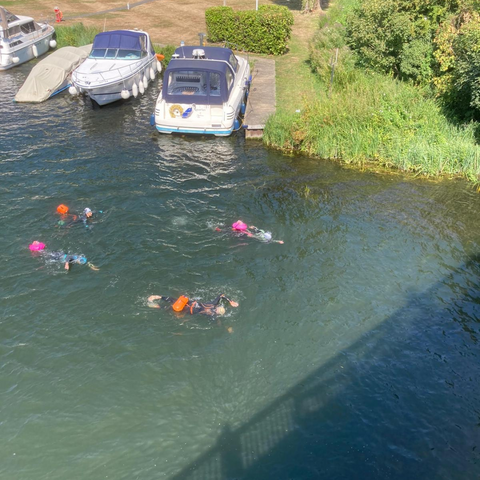Open Water Swimming - An Introduction
Open water swimming, an introduction
Literally speaking, open water swimming takes place anywhere that isn't a swimming pool. This means no bottom or divisions, no lanes and no controlled temperatures.

The term covers swimming in rivers, lakes, open Lidos and coastal sea swimming
Open, or cold water swimming is a unique experience and very different from pool swimming, and one all swimmers should try at least once.
Without the confines of lane ropes or walls, it’s liberating and adventurous and takes place in stunning surroundings.
Open water swimming also provides an element of thrill and swimming events can often be highly competitive, with swimmers jostling for position. It's real appeal is to commune with nature, swim wild and free and away from the busy pool environment.

So, what exactly is open water swimming?
Open water swimming pretty much means what it says. It can include open or cold water swimming locations eg. lakes, rivers, lochs, the sea and reservoirs. You can read our Safety Guides for every type of water here.
Most people find the freedom and lack of chemicals so invigorating they can’t help coming out of the water feeling happy and relaxed and there are proven benefits for physical and mental health and well being.
However, open water swimmers need to be aware that there are plants, fish and other things living in the water so you are not alone, which can add to the fun.
You might also see open water swimming referred to as wild swimming, cold water swimming or outdoor swimming. The names are pretty much interchangeable although generally most people use the term “open water” swimming.
The term wild swimming also refers to swimming in groups or individually where there is no supervision.

This is an element of risk in swimming alone and it is recommended you never go open water swimming on your own and always wear a tow float.
Open water swimming - the history
Of course swimming in lakes and rivers is an ancient activity. Open water competitive races have taken place in the UK for over a hundred years
Olympic swimming traces its roots to competitions in the sea, lakes and rivers rather than pools.
Modern open water swimming events tend to be held over longer distances than normally occur in pool swimming.
The sport has increased in popularity since both men’s and women’s 10 kilometre Marathon races were part of the Olympic Games in Beijing in 2008.
English swimmers Keri-anne Payne and Cassandra Patten (Swim Secure Ambassadors), won silver and bronze medals respectively in Beijing, 2008 for Team GB.

The 10k Marathon was one of the most popular events at the London 2012 Olympics, with thousands turning out to watch the open water swimming race held in the Serpentine in Hyde Park.
Open water swimming - is it for everyone?
Open water swimming can be for everyone of all abilities and age groups. Swimmers just need to have the ability and confidence to swim without being able to stand in the water.

It is highly likely that you’ll be out of your depth for some of the time so you must be prepared for this eventuality.
Open water swimming can be taken seriously (there are many competitive and elite open water and triathlon clubs across the UK) or as casually as you want it to be for the many social and well-being benefits.
Best Tow Float/Dry Bag Guide for Every Type of Swimmer
 Skip to content
Skip to content
